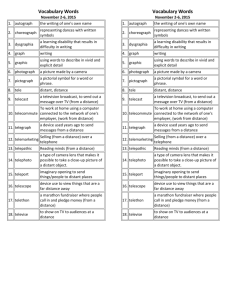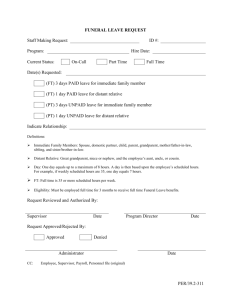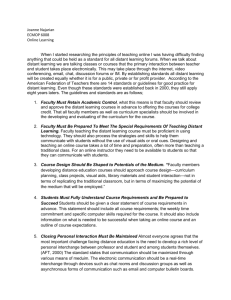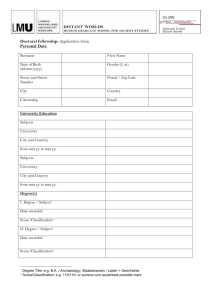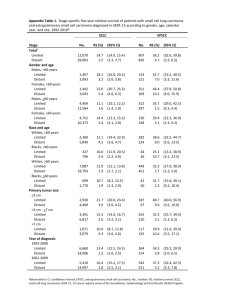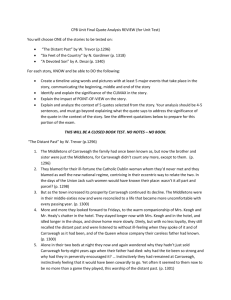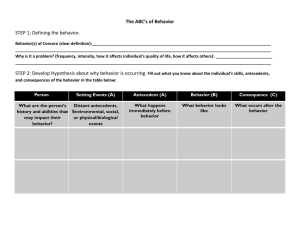WHY THE FAR COUNTRY - Sunset Ridge Church of Christ
advertisement
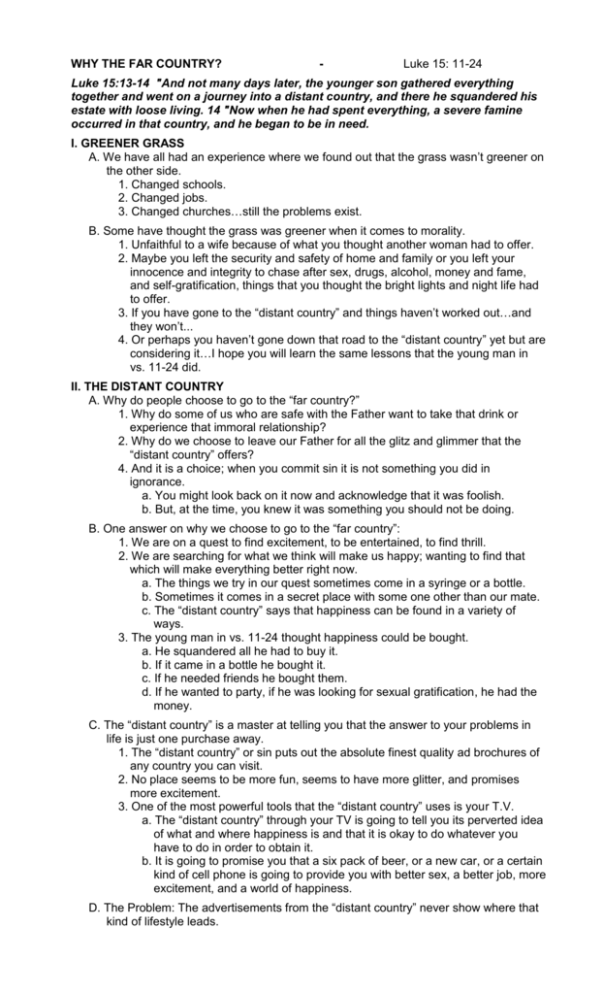
WHY THE FAR COUNTRY? - Luke 15: 11-24 Luke 15:13-14 "And not many days later, the younger son gathered everything together and went on a journey into a distant country, and there he squandered his estate with loose living. 14 "Now when he had spent everything, a severe famine occurred in that country, and he began to be in need. I. GREENER GRASS A. We have all had an experience where we found out that the grass wasn’t greener on the other side. 1. Changed schools. 2. Changed jobs. 3. Changed churches…still the problems exist. B. Some have thought the grass was greener when it comes to morality. 1. Unfaithful to a wife because of what you thought another woman had to offer. 2. Maybe you left the security and safety of home and family or you left your innocence and integrity to chase after sex, drugs, alcohol, money and fame, and self-gratification, things that you thought the bright lights and night life had to offer. 3. If you have gone to the “distant country” and things haven’t worked out…and they won’t... 4. Or perhaps you haven’t gone down that road to the “distant country” yet but are considering it…I hope you will learn the same lessons that the young man in vs. 11-24 did. II. THE DISTANT COUNTRY A. Why do people choose to go to the “far country?” 1. Why do some of us who are safe with the Father want to take that drink or experience that immoral relationship? 2. Why do we choose to leave our Father for all the glitz and glimmer that the “distant country” offers? 4. And it is a choice; when you commit sin it is not something you did in ignorance. a. You might look back on it now and acknowledge that it was foolish. b. But, at the time, you knew it was something you should not be doing. B. One answer on why we choose to go to the “far country”: 1. We are on a quest to find excitement, to be entertained, to find thrill. 2. We are searching for what we think will make us happy; wanting to find that which will make everything better right now. a. The things we try in our quest sometimes come in a syringe or a bottle. b. Sometimes it comes in a secret place with some one other than our mate. c. The “distant country” says that happiness can be found in a variety of ways. 3. The young man in vs. 11-24 thought happiness could be bought. a. He squandered all he had to buy it. b. If it came in a bottle he bought it. c. If he needed friends he bought them. d. If he wanted to party, if he was looking for sexual gratification, he had the money. C. The “distant country” is a master at telling you that the answer to your problems in life is just one purchase away. 1. The “distant country” or sin puts out the absolute finest quality ad brochures of any country you can visit. 2. No place seems to be more fun, seems to have more glitter, and promises more excitement. 3. One of the most powerful tools that the “distant country” uses is your T.V. a. The “distant country” through your TV is going to tell you its perverted idea of what and where happiness is and that it is okay to do whatever you have to do in order to obtain it. b. It is going to promise you that a six pack of beer, or a new car, or a certain kind of cell phone is going to provide you with better sex, a better job, more excitement, and a world of happiness. D. The Problem: The advertisements from the “distant country” never show where that kind of lifestyle leads. 1. They only show you the rose and not the thorns that are beneath. 2. They don’t tell you that verse 13 is followed by vs. 14. 3. They don’t tell you what Jesus says in this story and what Jesus says is true because it is impossible for God to lie. E. Notice how low Jesus takes the young man. 1. In the “distant country” the young man has all the friends he need until his money runs out. 2. When he needs food to eat his friends are not to be found. 3. The young man then finds work for a man who values the life of his pigs more than he does the boy; he has food for his pigs but none for the boy. F. The “distant country” won’t tell you all of this. 1. They don’t tell you about the drunk behind the drink made of Rocky Mountain Spring Water. 2. It doesn’t tell you about the divorce and shattered lives behind the drugs. 3. It doesn’t show you the poverty, desperation, or neglect behind the gambling or loose living. 4. It doesn’t show the shame, embarrassment, and the hardship caused by an immoral lifestyle. G. What this young man learned about the “distant country.” 1. He learned the hard way that the “distant country” doesn’t deliver on its promises. 2. Gone was his integrity, independence, and fortune. 3. The “distant country” left him starving, and dying…and according to vs. 24 it left him “dead and lost.” H. The only thing the “distant country” left him was his memory and his ability to think. Vs. 17: But when he came to his senses, he said, 'How many of my father's hired men have more than enough bread, but I am dying here with hunger! 18'I will get up and go to my father, and will say to him, "Father, I have sinned against heaven, and in your sight; 19 I am no longer worthy to be called your son; make me as one of your hired men. "' 20 "And he got up and came to his father. 1. As foolish as he was he at least realized what was happening to him. 2. Many do not realize that. 3. Then he was smart enough to know that he needed to go back to his father and then he was courageous enough to go. 4. Many today do not do that; they refuse; are you one of them? III. IF YOU HAVE MADE A MESS OF YOUR LIFE BUT HAVE COME TO YOUR SENSES, WHAT CAN YOU DO? A. He realized the truth about himself: Vs. 18: I have sinned… 1. He admitted the real reason for his problems: sin. 2. He acknowledged whose fault it was: “I”. B. He completely humbled and subjected himself to the will of his father: Vs. 19: I am no longer worthy to be called your son; make me as one of your hired men. "' 20 "And he got up and came to his father. 1. He completely humbled and subjected himself to the will of the father. 2. Because he did the father extends his mercy and grace on him and restores him to son-ship. CONCLUSION: In some form or fashion we have all left the Father and gone to the “distant country”, we have given in to sin. Many have realized that their journey there has made a mess of their life. Perhaps you are one of them. But realize this; it is not a one way street to the “distant country.” When you get there you do not have to stay. In this parable Jesus says, “Acknowledge your sin and confess your unworthiness, and then get up and come back home.” This boy did and he found out that his father would run to meet him. God will run to meet you. God wants you to come home. So, the moral to the story is: Quit looking for love in all the wrong places and get back to where you belong.
